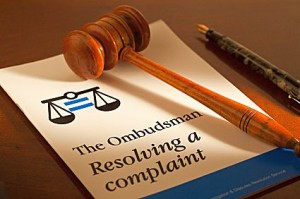Benson Nadell is Program Director of the San Francisco Long-Term Care Ombudsman Program. Long-term care ombudsmen are tasked with monitoring the quality of life at licensed LTC facilities, a tall order in this age of state budget crises, and economic and medical uncertainty. Mr. Nadell sat down with SevenPonds, and told us a little bit about his profession, and the challenges he and his fellows face here in San Francisco.
Antal: Tell us a bit about your line of work. What is a long-term care ombudsman?
Benson: The Long-Term Care Ombudsman Program is a Federal program, a part of the National Ombudsmen Resource Center. We here in San Francisco are one of 30 local ombudsman programs. There is a long-term care program in every state, this was mandated at the end of the 1970’s. Our basic mission is to protect the health, safety, welfare and rights of residents at licensed long-term care facilities.
Antal: Interesting. What does that entail?
Benson: Here in California we have a pretty wide range of duties. Basically, we’re abuse investigators. We receive mandated reports of abuse or neglect in licensed LTC facilities. We visit the facility and gather complaints, the stories, in order to better understand the issues that are adversely affecting residents. We investigate, and we work towards resolving the problem, similar to Adult Protective Services. That’s probably our primary function, but we have others. If an individual in a licensed nursing home wants to draft advance health care directives, one of the witnesses must be an ombudsman. This is written into California’s Health & Safety Code, it’s called the Ethel Procedure, that if a licensed nursing home resident does not have a surrogate decision-maker, and is unable to sign their directives or make the decisions themselves, than the nursing home is to convene a team, and a person who is licensed can be invited — this can include an ombudsman. This is actually quite common. The un-befriended, socially isolated elderly sometimes have no means to express their health care decisions. Ombudsmen can review decisions made by the team at the nursing home. We don’t want anyone making adverse decisions for others.
Antal: How are you notified of complaints?
Benson: They’re faxed in to us, or mailed or delivered. We receive the complaints, abuse reports, they’re called SOC-341 forms, and we visit the sites and investigate. We get these forms all the time.
Antal: How do you make sure the problems are rectified?
Benson: Our procedure is to contact the victim, the individual or individuals who filed the complaint (or complaints). We interview them, interview the employees at the long-term care facility, and then we coordinate with local law enforcement to make sure that the operators of the facility are following through. The California Long-Term Care Ombudsman Program is an office that manages these programs, overseen by Joseph Rodriguez, the State Ombudsman at the California Department of Aging. There are different long-term care regulation agencies in different counties, even in rural counties, and in each state, though they all have slightly different ways of doing things.
Antal: Do people ever reach out to you for advice on different placement options, if they are receiving poor care?
Benson: Yes, people do call us for different placement information. This is the Administration on Aging. They can use the Eldercare Locator to find their local facilities. Individuals and families, as well as elder care agencies, will call us when a patient is in a hospital and is ready for discharge, and they will ask us about the different assisted living or nursing homes in the Bay Area. They’ll ask for details about finance, conditions, all sorts of things, and we are expected to be able to answer them all. Sometimes these calls can be quite long.
Antal: Do you assist people with the move to a new facility?
Benson: No, we don’t physically move people or help with that process. There might be some of our people involved with a move from facility A to facility B, if a long-term care facility resident or their family calls us repeatedly for advice, that sort of thing, but it’s not something we do programmatically. Though there are cases, and this is mandated under federal law for licensed nursing homes and assisted living facilities, that if these facilities file for bankruptcy, the bankruptcy judge will contact the State Ombudsman, who will then have the local ombudsmen monitor the residents’ relocation process. I did this just recently, in fact. I conducted repeat visits to a facility to make sure that the residents there were not being neglected or abused by the cash-strapped management. This can be pretty trying. But no, we don’t physically move people.
Antal: How do you ensure that a long-term care facility is actually following through on your mandated reforms?
Benson: This is a pretty multi-faceted process. But we ombudsmen focus on the nail, not the hammer. Like the Adult Protective Services, we co-ordinate with respective regulatory agencies to fix the problem, such as the fire department if fire safety or emergency evacuation safety is the issue. We make note of the problem, and then another agency or agencies will see that it is fixed.
Antal: Would you ever advise a long-term care resident to seek a different facility, if the poor conditions or treatment are not remedied?
Benson: These days, we mostly just try to fix the problem, because the days when families on MediCal could move to better places are pretty much over. If the resident’s income is low or they’re on MediCal, they’re options will be quite limited. Right now, MediCal beds are high demand and limited supply. Here in San Francisco we’ve lost about 1,000 beds over the last few years. When someone asks if they should move we might make sure they realize it’s not just a matter of moving them out, and most people on MediCal are spending down their savings. In the last decade, our population’s been aging, so demand for assisted living has increased dramatically, and at the same time MediCal funding has decreased. People with certain ailments are particularly adversely affected. Dementia patient in particular are having a hard time, because of their behavioral issues, they have to find places that are able to treat them sensitively.
Antal: It sounds like there are a lot of challenges out there.
Benson: Yes, there are.
 Antal: What do you have to tell our readers about volunteering with their local ombudsman program?
Antal: What do you have to tell our readers about volunteering with their local ombudsman program?
Benson: I’d say it’s one of the more exciting and challenging volunteer opportunities out there. You have to pass a 40-hour training, usually on the weekends. I work full-time here during the week, and then conduct the trainings myself on Saturdays. Most of our volunteers are retired lawyers retired professionals or university student interns. We are extraordinarily grateful for our volunteers: they actually conduct a lot of the weekly visits and delegate remedies, cause there are just too many cases for the paid staff to handle effectively. It’s a truly honorable service that they offer.
Antal: Thank you so much for telling us about your work. You’re right, it is an honorable service.
Benson: Thank you. I appreciate the work that you’re doing also. I hope you keep it up.
Antal: Do you have any final words for our readers?
Benson: No matter where a person is in life, if they wind up in hospital, I hope that they continue to remain empowered as the center of their own decision-making. Families and the ill and elderly should always contact an ombudsman if they have any problems at their facility, or if they need help making sure that their own health care choices are honored.
- Be sure to have The Conversation with your loved one, long before the worst happens.
- Quality of care that long-term care residents receive is a concern for all of us: here is an article from the archives addressing end-of-life disparities.
- Sevenponds reviews Eleanor Clift’s exploration of the end-of-life, from the personal to the political.

 What Is an Ombudsman? An Interview with Benson Nadell
What Is an Ombudsman? An Interview with Benson Nadell




 How Dare You Die Now!
How Dare You Die Now!
 Debating Medical Aid in Dying
Debating Medical Aid in Dying
 “Help Me, Helen”
“Help Me, Helen”














